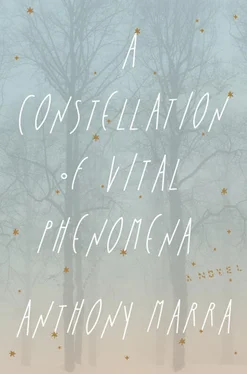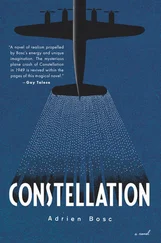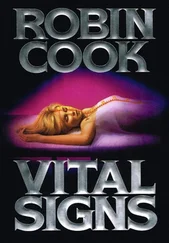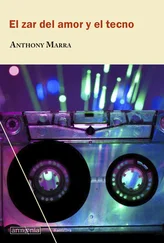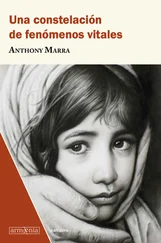“I saw six chariots in the sky today. I would have rather seen an ice machine.”
For the next hour Laina described abounding supernatural phenomena. The angel Gabriel had fluttered into a rooster-less henhouse in Zebir-Yurt, and the next morning a farmer found eight immaculately conceived eggs. A boy in Grozny defeated his grandfather, a chess master third class, ranked one thousand six hundred and eighty-fourth in the world, after a game lasting thirty-nine sleepless days and nights that left the grandfather so bewildered, proud, and exhausted he promptly died. A band of corpse-devils rose from the earth at the Dagestan border to hijack three Red Cross cargo trucks, leaving the drivers hog-tied and blindfolded and magically suspended three meters in the air.
“Stalin has been resurrected,” Laina said.
“I know,” Sonja replied. “He’s the prime minster of Russia.”
On her way to work a week later, when the black Mercedes found her, she was sure she’d wandered into one of Laina’s deliriums. The Mercedes braked sharply, drawing a curtain of dust along the street. The tires — before so dainty they could only drive in circles on a tennis court — were replaced with those of an armored jeep, raising the body of the car by a half meter. Swedish license plates, she noted, were still attached. The window descended and those gorgeous fingernails beckoned her.
“I thought we wouldn’t see each other again,” she said, pulling the door closed.
“And I keeping saying I’ll never see Alu again and he keeps on being my brother. You intrigue me. You lived in London for several years, if my information is correct, which it always is. Had you stayed, you would be eligible for citizenship now. Even I can’t get my name into one of those beautiful maroon passports. And yet you returned.”
“I have family here,” she said uneasily.
“I hide the toilet paper when my family visits so they won’t stay too long.”
“Could you get me back to London?”
“You could ask. But then who would I have to talk to? No one with your intelligence would return from London, which means you are either one of those idiot savants, light on the savant, or something entirely different. The only people who return are people like me, people who know how much money can be made.”
Through the window, the city limits gave way to brown fields tilled by tank treads. They were on the road to Grozny. “I’m not here to make money.”
“That’s why you are so intriguing.”
They reached the Grozny garage two hours later. Two dour-faced men met them at the door holding Kalashnikovs, one still three weeks from killing the other in an argument that would begin over driving directions, and Sonja feverishly hoped that the smuggler’s love for Alu the Turtle still surpassed his loathing for Alu the Unluckiest Younger Brother in History. Three trucks sat at the end of the concrete tarmac. The brother led her to the first truck, whose shot-off lock clung by a half-broken, glimmering grip. He lifted the door and shined a flashlight into the trailer. A Red Cross first-aid kit sat in the circle of yellowed light. The circle spread to illuminate torn cardboard boxes and hundreds, no, thousands of first-aid kits. “These were stolen,” she said.
“Of course they were, and not without some headache, I’ll have you know. But as you said, nearly all of what you asked for can be found in a first-aid kit.”
“What happened to the drivers?”
“Why do you care?”
She could feel him testing her, ready to blunt the slightest edge of moral outrage with a lecture on relativism in war, or maybe with another example of his contempt for Alu. She unsnapped the first-aid kit and surveyed the contents. Four absorbent compress dressings, eight adhesive bandages, a tube of antiseptic ointment, a breathing barrier, two latex gloves, a gauze roll, a thermometer, a packet of aspirin, and a scissors. She closed the lid, refastened the clips, had nothing but gratitude to give him. For all she cared, the drivers could be hog-tied and beaten, since she now had the ointment to disinfect their cuts, the gauze to bandage their wounds, even scissors to cut through whatever magical threads held them three meters off the ground.
“What about the morphine?”
“I nearly forgot.” He pulled a black nylon duffel bag from the front seat, set it on the bumper, and unzipped it. A plastic-wrapped brick of white powder lay at the bottom. “Morphine is too expensive,” he said, handing it to her.
“What is it?”
“Heroin.”
The word alone weighed ten kilograms. This powder had been boiled and squirted between Natasha’s toes twice a day for eight months. My god. And for the first time in how many days, she breathed the relief of knowing Natasha was safe at home, barricaded behind a water-glass moat, safe from the fangs of dragons. “Is it unadulterated?”
“Not enough sugar in there to sweeten a cup of tea.”
“I asked for morphine.”
“And even had you done me the favor of lobotomizing Alu while he was under your care, I wouldn’t get you morphine. Heroin is much cheaper.”
“I want something else, then.”
“So do I. There are only a few departments open in your hospital, yes? If you rent me some unused space, we can continue this arrangement.”
“For what?”
“My wares.”
“No guns, drugs, or people.”
“Of course not,” he said. “I keep them at home. No, mainly national treasures looted from city museums that can be sold abroad.”
“Fine. I want an ice machine. The hospital has been without one for several months. A bearded man at the bazaar is selling a nice one from the Intourist Hotel. Feel free to be rough with him. And where are the books I asked for?”
“You’ve chosen the wrong profession,” he said, enjoying her stubbornness. “You’re a natural swindler. You’d run me out of business. I’ve had difficulty finding them, but they should come in shortly. A third cousin in the West is asking for them from Amazon.”
“What’s that?”
“I haven’t any idea. This kid can make your books appear from the ether. He’ll run me out of business, too.” He shook his head. “The whole world is conspiring to run me out of business.”
“And another thing.”
“Now you’re really beginning to annoy me. If you keep it up, I’ll have to bring my brother with me next time.”
“I want new clothes.”
And he laughed and laughed and laughed.
Two weeks later Sonja returned from the hospital wearing a maroon cashmere sweater, tan leather boots, and a pair of one-size-too-tight jeans displaying curves that the chemistry professor would have found a whole hive nesting on, had his eyes still worked. The weight of the psychology textbooks strained the rucksack straps against her shoulders. Her left hand, wrapped around a glass of ice, was numb.
In the hall she stopped at Laina’s door, wanting to leave the ice for her neighbor. The murmur of voices inside stopped her. She crouched to the keyhole. Were Laina’s hallucinations speaking back to her?
“There were twelve chariots in the sky today? That’s two more than yesterday.” Natasha’s voice basked beneath a sun that never shone when she addressed Sonja. It was good to hear Natasha care, even if it wasn’t for her.
“Twelve,” Laina said. “I think they’re up to something.”
“Like what?”
“Who knows? Trying to steal the Moon to sell at the bazaar. Protecting the skies from Federal planes. Maybe trying to figure out how to get their horses down from the clouds.”
Natasha’s voice softened. “In the winter of the war, before I went to Italy, when the bombing was at its worst, I was afraid the apartment block would be hit. So I lived in City Park. I remember the City Park Prophet once said everything that isn’t darkness or death is a vision. I remember he said we are all God’s hallucinations.”
Читать дальше
